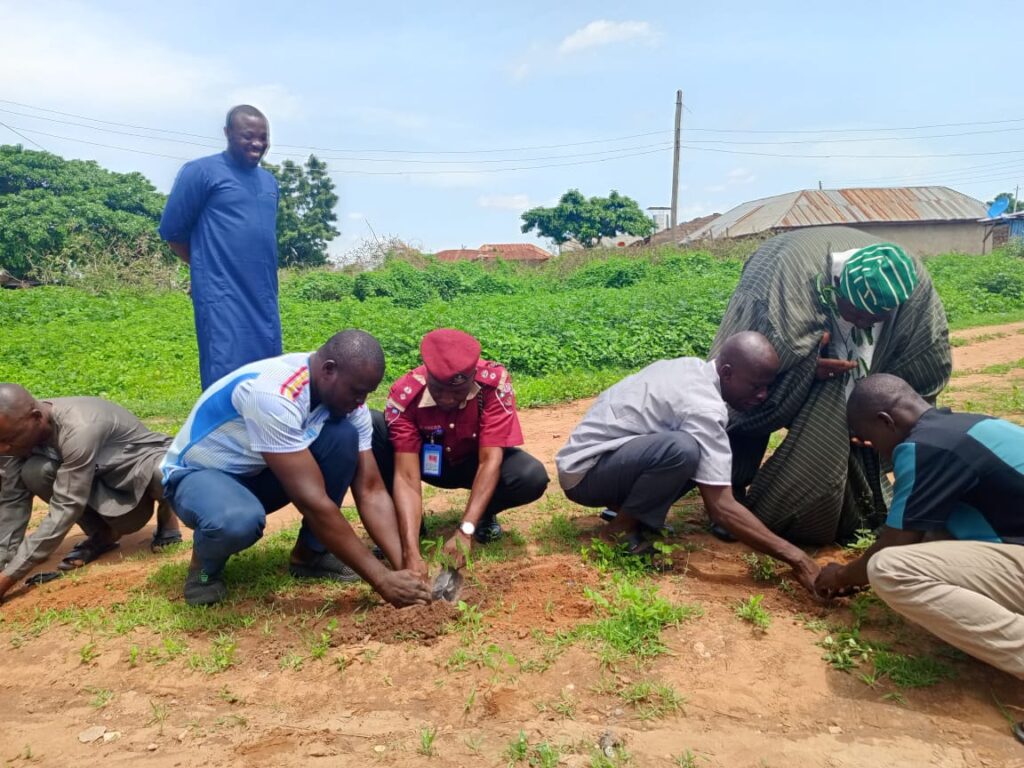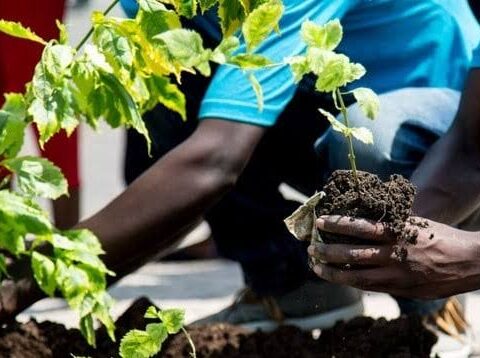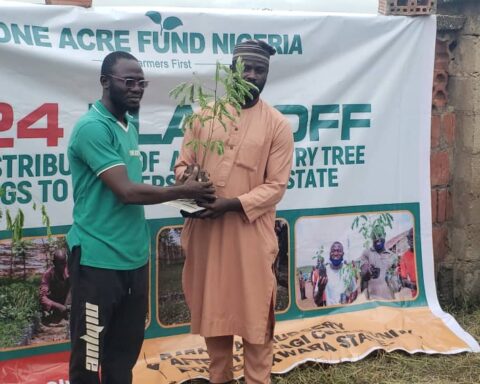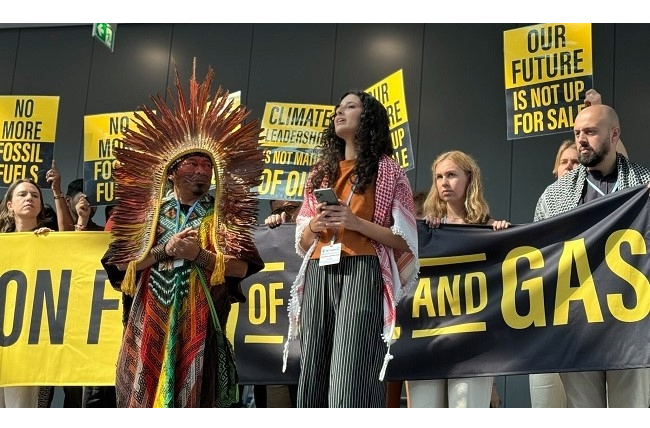In the sleepy rural community of Onipako, just outside Jebba in Moro Local Government Area of Kwara State, something remarkable is taking root literally.
Beneath the hot June sun, hundreds of farmers gathered this week to receive thousands of free tree seedlings. But these are no ordinary trees.
For many, they represent a lifeline against worsening climate shocks and persistent food insecurity.
The initiative, led by non-profit organization One Acre Fund, aims to distribute 1.3 million fast-growing, income-generating tree seedlings to 46,550 smallholder farmers across Kwara.
It is a bold intervention positioned at the intersection of climate resilience, environmental restoration, and rural livelihoods, an increasingly urgent trifecta in Nigeria’s fight against ecological collapse.
“Nigeria is losing forest cover at an alarming pace of 350,000 hectares per year,” says Fred Adzoyi, Team Lead at One Acre Fund. “That’s not just about trees. It’s about water, soil, biodiversity, and ultimately food.”
This isn’t the first time One Acre Fund has mobilized such large-scale agroforestry action. In 2024, the NGO distributed 6.57 million trees to over 243,000 farmers in Kwara, Niger, and Nasarawa States, including high-value species like mango, cashew, and citrus.
But this year’s Kwara-only campaign marks a significant step up, especially in a region where rural farmers are increasingly on the frontlines of Nigeria’s climate crisis.
Nigeria loses an estimated 350,000 hectares of forest annually, a threat that weakens its climate resilience and agricultural productivity. Yet, through One Acre Fund’s model, smallholder farmers are helping reverse this trend: in 2023 alone, 111,000 Nigerian farmers planted 2.7 million trees.
According to the organization, the goal is not just to reforest but to transform vulnerable communities into climate-resilient zones.
“These trees regenerate degraded land, improve soil fertility, reduce erosion, and help farmers better withstand erratic weather. “They also offer long-term income opportunities from fruit and timber,” Mr. Adzoyi explained.
The benefits are not abstract. Many of the farmers receiving seedlings today will begin to see economic returns within two to three years. In a nation where over 70% of rural households rely on agriculture, integrating trees into farmland through agroforestry offers both ecological and financial benefits.
One Acre Fund estimates that trees planted generate substantial asset value for participating farmers beyond what non-participating farmers earn. For example, the “tree program impact” estimated an asset value of approximately $189.4 million (overall across countries) and a social return on donor investment of US$10.40 generated for every US$1 invested in the tree-planting work.
Rukayat Alabi, a 45-year-old cassava farmer from nearby Bode Saadu, said the initiative is giving the farmers hope again
“We’ve lost crops to floods and heatwaves. Now these trees might protect our land and also feed our children,” she said.
Nigeria is losing its forest cover at an estimated rate of 350,000 hectares per year, a rapid pace that threatens biodiversity, water sources, and food systems. The tree-planting initiative helps regenerate degraded land, thereby directly contributing to the slowing of deforestation.
The initiative not just plants trees but also distributes fast-growing, income-generating seedlings, aligning with climate resilience strategies (e.g., reducing erosion, improving soil fertility) and food security.
The Climate-Food Nexus
Kwara’s state government is already calling the project a “strategic win” for its climate and agricultural agenda.
Representing the Commissioner for Environment at the launch event, Abdulrahman Olumoh emphasized that planting economic trees is not only about protecting the environment, but also “safeguarding our farmers’ livelihoods and future food systems.”
“Agroforestry has proven to be one of the most effective ways to increase farm productivity while preserving the environment.
“These trees will improve soil fertility, water retention, and even serve as income sources,” he said.
The move couldn’t be more timely. In recent years, Nigeria has faced intensifying floods, soil degradation, and desert encroachment, displacing thousands and devastating agriculture. According to the World Bank, climate change could cost Nigeria up to 30% of its GDP by 2050, with food production bearing the brunt.
Smallholder farmers who grow 90% of the country’s food are among the hardest hit. Many lack access to irrigation, improved seeds, or financial safety nets. What they do have, increasingly, are degraded soils and erratic rains.
But by introducing climate-resilient trees, One Acre Fund is helping farmers turn their lands into buffers against these shocks and, in some cases, into carbon sinks that may soon qualify for global carbon credit markets.
Through agroforestry and distributing tree seedlings, rural farmers not only get environmental benefits but also income generation via fruit, timber, or other tree-based produce. This helps reduce dependency on single cropping and vulnerable ecosystems.
The scale-up from 2022 to 2024 shows that farmer participation and infrastructure (nurseries, seedling distribution) are expanding rapidly, demonstrating the replicability and growth potential of the model.
Greening the Future, One Farmer at a Time
Underneath the surface of this mass tree distribution is a deeper story of empowerment. Farmers are not just recipients; they are partners in climate restoration.
The One Acre Fund model includes on-farm technical support, access to high-value species, and training in how to care for the trees for long-term gains.
“This is not charity,” said Adzoyi. “It’s a partnership. We’re putting power back in farmers’ hands, not just to survive climate change, but to shape what resilience looks like.”

It’s a message that resonates with Mustapha Umar, a maize farmer in Kaiama. “I never thought planting trees could help me harvest more crops. But last year, I saw the difference. My yam farm had better soil, and the fruits sold well in town,” he said.
If sustained, initiatives like this could reshape Nigeria’s rural landscape, reviving barren fields, restoring ecological balance, and reimagining food systems from the roots up.
For now, as the sun sets over Onipako, the seedlings are in the ground. Their leaves flutter in the breeze, a quiet, green defiance against the storms to come.
By Dare Akogun







